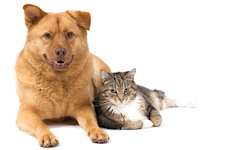 |
You are receiving this e-mail as a part of your subscription to Dr. Jones' newsletter, 'Veterinary Sec.rets'. See subscription information below. |
| |
|
 Hello Friend, Hello Friend,
Wondering if there is something you can do for your sick or injured pet?
If your dog or cat is seriously ill, see your vet. But there are MANY things you can be doing at home, and in my Inner Circle, you'll get access to all of my Digital videos, books and special reports. It's a great place to start:
http://www.theonlinevet.com/innercircle.php
---------------------------------------------
Fever in Dogs and Cats
---------------------------------------------
SIGNS
Your pet has a decreased appetite and lower energy. His ears are hot to the touch and he pants excessively in the house.
CAUSES
A fever is usually caused by a bacterial or viral infection. Having a high temperature makes it more difficult for bugs to grow in the body. The problem with a fever in pets is that they will often stop drinking; dehydration then becomes the primary concern. A normal dog’s temperature is 101 F (38.0 C), a normal cat’s temperature is 102 F (38.5 C). Taking your pet’s temperature involves placing a thermometer in their rectum. If your pet has a temperature of 103.5 F (39.5 C) or more, they have a fever.
Your pet usually will have a fever in response to something going on in their body. The most common cause, I find, is bite wounds. Search your dog or cat well for punctures. 
SOLUTIONS
KEEP THEM HYDRATED. Offer plenty of fresh water in different spots around the house. If your pet refuses to drink, use an eyedropper or turkey baster to squirt water into the side of its mouth. Minerals become depleted when your pet is dehydrated; for an added boost, add Pedialyte, an electrolyte solution available from the pharmacy. Some pets prefer chicken or beef broth, or tuna juice; give them whatever works.
CALL YOUR VETERINARIAN. If a fever persists for more than 24 hours, and your pet is not drinking, then call your vet.
COOL COMPRESS. If your pet will tolerate it, apply a cold cloth to her belly. The exposed skin will result in some fairly rapid cooling, making her feel a little better.
VIRAL HERBAL FEVER CONTROL. Two of the more common Fever/Viral remedies include CATNIP, BONESET and GINGER. You can combine the tincture, give 1 drop per pound twice daily.

P.S. Fever is one of the first indications of underlying disease- often it's more important to determine the exact cause. Your vet will start with a physical exam, and I suggest you do the same. See how to do this in simple step by step video here:
http://www.theonlinevet.com/innercircle.php
Heal Your Pets At Home!
Best Wishes,
Dr Andrew Jones

DISCLAIMER: This information is for educational purposes only and is not intended to replace the advice of your own veterinarian. Dr Andrew Jones resigned from the College of Veterinarians of B.C. effective December 1 2010, meaning he cannot answer specific questions about your pet's medical issues or make specific medical recommendations for your pet.
PRIVACY POLICY: We will never rent, sell, loan, provide, barter, exchange or in any way make available your personal information to others. You can unsubscribe or change your email address at any time using the links at the bottom of this email.
Copyright 2010 Four Paws Online Ltd.
Tel: 1-800-396-1534
Fax: 1-888-398-1378
www.veterinarysecretsrevealed.com
support@veterinarysecretsrevealed.com
|
|
|
|